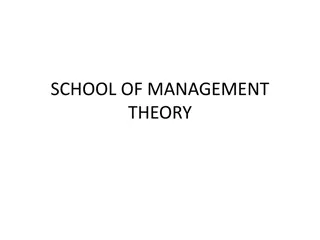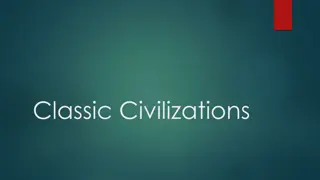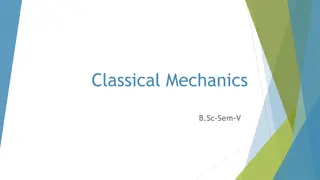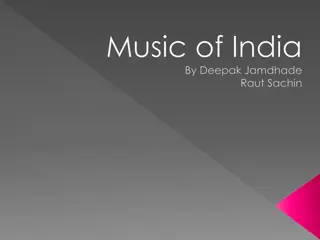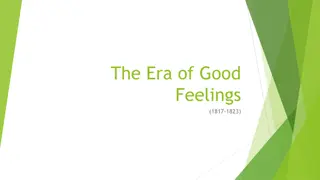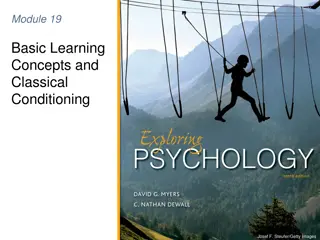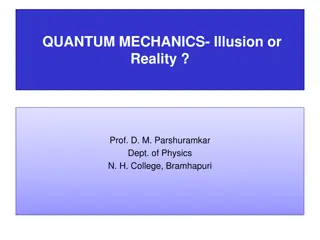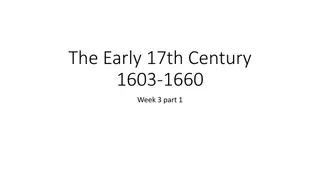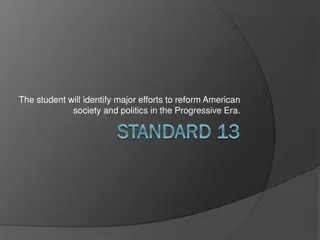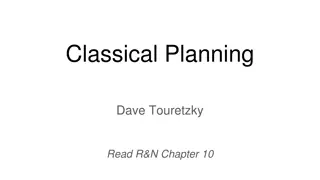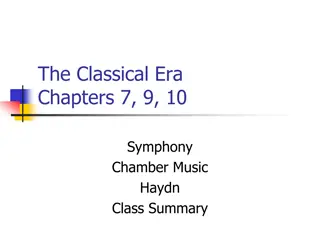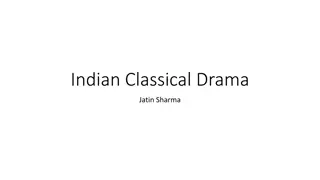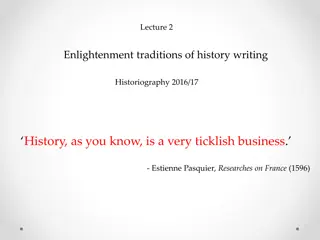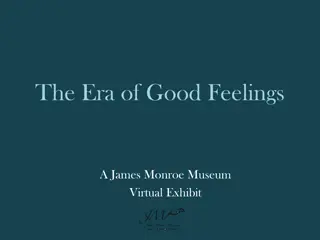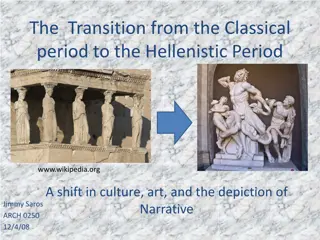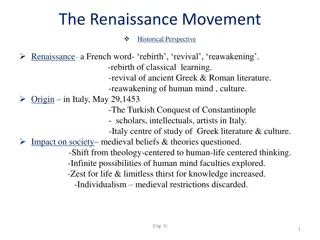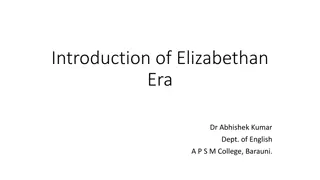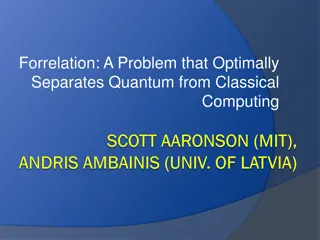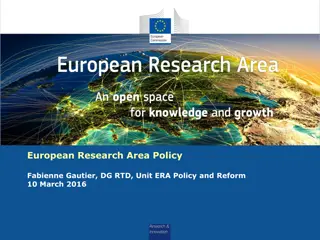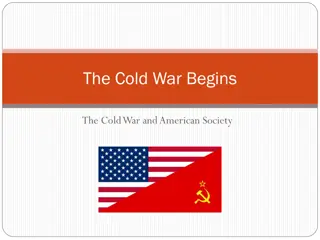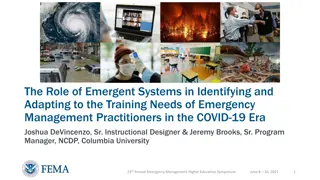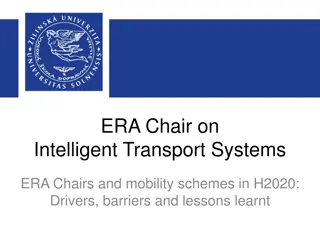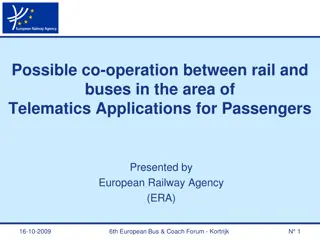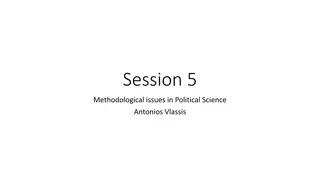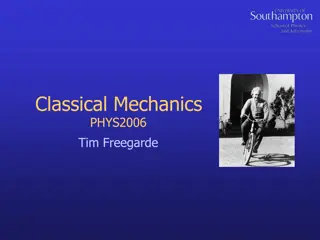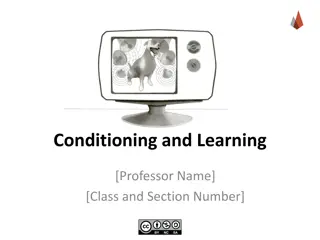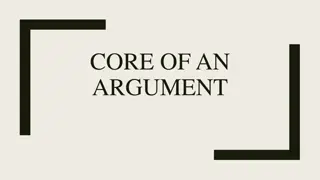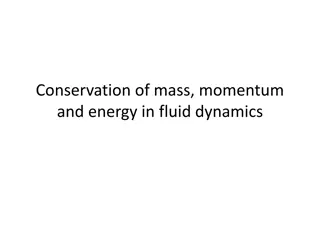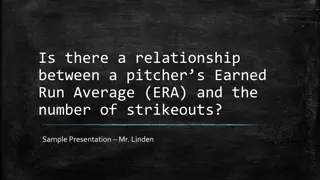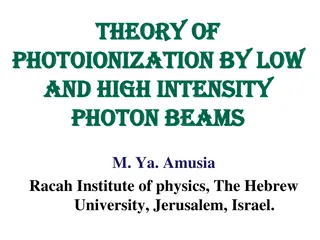Evolution of Management Theories: Classical Approach and Scientific Management
Explore the evolution of management theories focusing on the Classical Approach and Scientific Management. The Classical Approach emphasizes efficiency and specialization, while Scientific Management introduced systematic methods to increase productivity. Learn about key figures like Frederick Winsl
6 views • 31 slides
Advancing the European Research Area (ERA) Towards Innovation and Excellence
The European Research Area (ERA) aims to boost research and innovation investments, enhance market uptake, and promote excellence by prioritizing certain objectives. With significant achievements in R&D expenditure and researcher growth, the ERA is focusing on deepening and broadening its impact thr
0 views • 9 slides
Understanding Classical Civilizations: Timeline Analysis and Periodization
Explore the concept of periodization by creating a timeline of significant life events and categorizing them into distinct periods. Learn about classical civilizations, time periods, and the process of dividing history into eras. Dive into the Classical Age and its contributions to human development
1 views • 24 slides
Understanding Classical Mechanics: Variational Principle and Applications
Classical Mechanics explores the Variational Principle in the calculus of variations, offering a method to determine maximum values of quantities dependent on functions. This principle, rooted in the wave function, aids in finding parameter values such as expectation values independently of the coor
0 views • 16 slides
Diverse Music Traditions of India - Classical to Folk
Explore the rich musical heritage of India, encompassing classical Carnatic and Hindustani music, folk melodies, film songs, and pop music. Learn about the intricate nuances of Indian classical music, its historical evolution, and the variety of genres within the music landscape of the country.
0 views • 8 slides
History of Extension Education and Development in India
This detailed content outlines the history and evolution of extension education and development in India, from early initiatives by outstanding individuals to the establishment of agricultural research institutions and the implementation of various schemes for rural reconstruction. It covers key sta
0 views • 15 slides
The Era of Good Feelings and Westward Expansion in Early 19th Century America
The Era of Good Feelings (1817-1823) marked a period of national unity and political agreement in the United States, leading to a focus on expansion and development. This era saw significant diplomatic achievements and a surge in westward migration, particularly to areas like the Old Northwest and O
0 views • 19 slides
Examples of Classical and Operant Conditioning
Robert receiving a ticket for driving under the influence illustrates operant conditioning with negative punishments, while Chris being afraid of dogs after being bitten showcases classical conditioning with stimulus generalization. Jacob's joy from smelling his date's cologne demonstrates classical
1 views • 9 slides
Understanding Basic Learning Concepts and Classical Conditioning
Acquiring new information and behaviors through experience is known as learning. One common way we learn is through associative learning, where we connect certain events together. This process can take the form of classical conditioning, where stimuli evoke automatic responses, or operant conditioni
1 views • 14 slides
Exploring Quantum Mechanics: Illusion or Reality?
Delve into the fascinating realm of quantum mechanics with Prof. D. M. Parshuramkar as he discusses the contrast between classical and quantum mechanics. Discover how classical mechanics fails to predict the behavior of electrons in atoms and molecules, leading to the development of quantum mechanic
1 views • 70 slides
Literature and Historical Events in the Early 17th Century
Queen Elizabeth's death, James I's reign, Charles I's civil war, and Cromwell's era marked the early 17th century. Major literary works by Donne, Jonson, and Bacon flourished, reflecting the social and political turmoil of the time. Jacobean writers like Herbert and Marvell emerged, paving the way f
6 views • 7 slides
Evolution of Optical Technology: From Telegraph to Photonic Integrated Circuits
The journey of optical technology evolution spans from the invention of the telegraph in 1836, through the introduction of optical fibers in 1978, to the development of photonic integrated circuits in the present era. Key milestones include the advent of optical amplifiers in 1990, the emergence of
0 views • 70 slides
Efforts to Reform American Society in the Progressive Era
Major reform efforts in the Progressive Era included Upton Sinclair's expose of the meatpacking industry in "The Jungle," resulting in federal oversight. Women played a significant role in reform movements, with Jane Addams establishing Hull House to aid immigrants. The era also saw the rise of Jim
0 views • 34 slides
Understanding Classical Planning in Artificial Intelligence
Classical planning in AI involves problem-solving with defined states, actions, preconditions, and effects. This text explores the concept of planning, classical planning characteristics, and provides examples such as the rocket problem with optimal and suboptimal plans.
0 views • 38 slides
Understanding Classical Era Symphony and Chamber Music
In the Classical Era, symphonies emerged as standalone works separate from operas, featuring a typical format of four movements with varying moods and tempos. Chamber music, enjoyed by players and listeners alike, particularly the string quartet, was popular. Haydn, with patronage from the Esterhazy
5 views • 7 slides
Insights into Indian Classical Drama and Literature
Explore the rich tradition of Indian classical drama and literature, from its origins in Ujjain during the Gupta period to the classification of major and minor dramas. Learn about the components of a classical Sanskrit drama, such as the plot, characters, sentiments, acting, and more. Delve into th
1 views • 9 slides
Renaissance Historiography: Writing Histories in the Enlightenment Era
The Enlightenment period saw a shift in historical writing towards valuing the past for its own sake. Scholars like Francesco Petrarch and Estienne Pasquier explored different approaches to interpreting history, incorporating philology, individual chronicles, and the portrayal of great men and women
0 views • 35 slides
Virtual Exhibit: The Era of Good Feelings - James Monroe Museum
Explore the virtual exhibit showcasing James Monroe's presidency, known as the Era of Good Feelings, a time of nationalism and political unity in the United States. Discover different aspects of Monroe's terms, from politics to treaties, to evaluate the era's significance.
0 views • 23 slides
Classical Conversations Plus Program Overview
Explore Classical Conversations Plus program partnership opportunities, including the SEU partnership for homeschool students in grades 11-12. Learn about the administrative team, benefits, courses, and the Classical Christian education background rooted in the Western tradition. Discover how parent
0 views • 11 slides
Transition from Classical to Hellenistic Period: Art and Narratives
The evolution from the Classical period to the Hellenistic period in Ancient Greece brought significant shifts in culture, art, and storytelling. Classical art focused on idealized human forms and naturalistic poses, while Hellenistic art embraced more dramatic expressions and emotions. The narrativ
0 views • 23 slides
Evolution of English Vocabulary during the Renaissance
The English Renaissance era saw a significant influx of Latin and Greek words into the English language, enriching its vocabulary. Classical works were translated, introducing new terms like genius, specimen, criteria, and more. This era also saw the introduction of Greek-based suffixes like -ize an
0 views • 19 slides
Understanding Vacuum Fluctuations in Quantum and Classical Physics
Explore the intriguing concept of vacuum fluctuations in both classical and quantum physics, delving into their experimental effects and significance. From classical interpretations of empty space to quantum field theory's zero-point fluctuations, discover how vacuum properties influence particle in
0 views • 38 slides
The Renaissance Movement: Historical Perspective and Impact on English Literature
The Renaissance, meaning "rebirth," was a period of revival in classical learning, centered in Italy after the Turkish Conquest of Constantinople in 1453. This era saw a shift from medieval beliefs to human-centered thinking, with a focus on exploring the limitless possibilities of the human mind an
0 views • 9 slides
Insight into the Elizabethan Era: Queen Elizabeth's Reign
The Elizabethan Era under Queen Elizabeth's reign marked a transformative period in England, characterized by a shift from darkness to light in various aspects of English life. Queen Elizabeth's dedication to England and her inspiring patriotism brought about unity and national greatness, amidst rel
0 views • 9 slides
Quantum vs. Classical Computing: Exploring Forrelation Problem
Delve into the world of quantum and classical computing with the Forrelation problem that optimally separates the two realms. From Fourier correlations to quantum algorithms and classical lower bounds, explore the intricacies of distinguishing between quantum and classical computation through variou
0 views • 29 slides
Importance of ERA in Advancing European Research Area Policy
The European Research Area (ERA) is crucial for enhancing EU's role in R&D policy, meeting higher R&D expectations, promoting national research systems, enabling transnational cooperation, fostering gender equality, and facilitating knowledge transfer. The ERA Roadmap outlines priorities such as eff
0 views • 15 slides
Evolution of Criminal Law and Thought: From Pre-Classical Era to Enlightenment
Explore the progression of criminal law and thought from the Pre-Classical School of Thought to the Enlightenment era. Delve into concepts like folkways, mores, and the origins of criminal law, including examples such as societal norms, dress codes, and supernatural explanations for behaviors during
0 views • 23 slides
The Impact of the Red Scare and McCarthyism on American Society
The Cold War era saw the rise of the Red Scare and McCarthyism in America, fueled by fears of Communist infiltration. The loyalty review program, House Un-American Activities Committee, and infamous cases like Alger Hiss and the Rosenbergs reflect the intensity of the anti-Communist hysteria. Joseph
0 views • 12 slides
Emergent Systems for Training Needs in COVID-19 Era
Explore how emergent systems can identify and adapt to the training needs of emergency management practitioners during the COVID-19 era. The symposium delves into analyzing feedback from pandemic-era trainings, aligning emergent themes with national preparedness assessments, and offering recommendat
0 views • 11 slides
The Logical Structure of Classical and Quantum Mechanics
The paper explores the common logical structure shared between classical and quantum mechanics, emphasizing the non-distributive lattice embedded in a distributive one. It discusses how all physical theories must adhere to this structure, incorporating topology, Heyting algebra, Boolean algebra, and
1 views • 36 slides
Advancing Intelligent Transport Systems Through ERA Chair Program
The ERA Chair program focusing on Intelligent Transport Systems (ITS) has significantly impacted research and innovation at the University of Zilina. Driven by key personnel like Dr. Karl Ernst Ambrosch, Dr. Dietrich Leihs, and Prof. Tatiana Kovacikov, the initiative has led to enhanced internationa
0 views • 19 slides
European Railway Agency's Role in Promoting Cooperation between Rail and Buses in Telematics Applications
The European Railway Agency (ERA) plays a crucial role in enhancing cooperation between rail and buses through Telematics Applications. Established in 2004, ERA focuses on recommending legislation, ensuring interoperability, and enhancing safety in the European rail network. Recommendations made by
0 views • 17 slides
Basics of Learning: Classical and Operant Conditioning Overview
Types of learning include classical conditioning, operant conditioning, and observational learning. Classical conditioning involves pairing a neutral stimulus with a meaningful one to elicit a response. Operant conditioning focuses on how consequences influence behavior. Terminology like UCS, UCR, N
0 views • 66 slides
Understanding Classical Marxism: Key Concepts and Critiques
Marxism, rooted in the ideas of Karl Marx, emphasizes the significance of economic relations in shaping social and political structures. Classical Marxism focuses on economism, determinism, materialism, and structuralism, viewing history through a lens of class struggle and offering an emancipatory
0 views • 21 slides
Exploring Classical Mechanics in Physics
Delve into classical mechanics with topics ranging from helicopter dynamics and bicycle dynamics to inclined planes and the principles of Newton's laws of motion. Learn about the unique characteristics of instruments like the pianoforte and the foundational principles governing linear and angular mo
0 views • 14 slides
Understanding Classical Conditioning: Pavlov's Experiment and Responses
Explore the principles of classical conditioning through Pavlov's experiment, including the types of responses like conditioned emotional reactions. Learn about the components of classical conditioning such as unconditioned stimulus and response, conditioned stimulus and response, and how the proces
0 views • 42 slides
Crafting a Persuasive Classical Argument
Crafting a persuasive classical argument involves following a structured approach that includes grabbing the reader's attention in the introduction, presenting the writer's position with reasons and evidence, summarizing and critiquing alternative views, and concluding with a strong final impression
0 views • 30 slides
Understanding Conservation Principles in Fluid Dynamics and Classical Mechanics
Conservation principles play a significant role in fluid dynamics and classical mechanics. In fluid dynamics, conservation of mass, momentum, and energy are crucial for understanding fluid behavior. Classical mechanics, on the other hand, relies on Newton's laws to describe motion and energy conserv
0 views • 46 slides
Exploring Pitcher's ERA and Strikeout Relationship in Baseball
An analysis was conducted to investigate the relationship between a Major League pitcher's Earned Run Average (ERA) and the number of strikeouts during the 2018 regular season. Using a simple random sample of 30 pitchers, a correlation coefficient of -0.376 was found, indicating a moderately weak ne
0 views • 10 slides
Evolution of Photoionization Studies: From Classical Predictions to Quantum Triumph
Tracing the journey of photoionization studies from classical predictions to experimental rejections, quantum interpretations by Einstein, and current understanding through a classical approach. Highlighting key experiments, laws of photoeffect, and limitations faced in describing strong field situa
0 views • 47 slides
